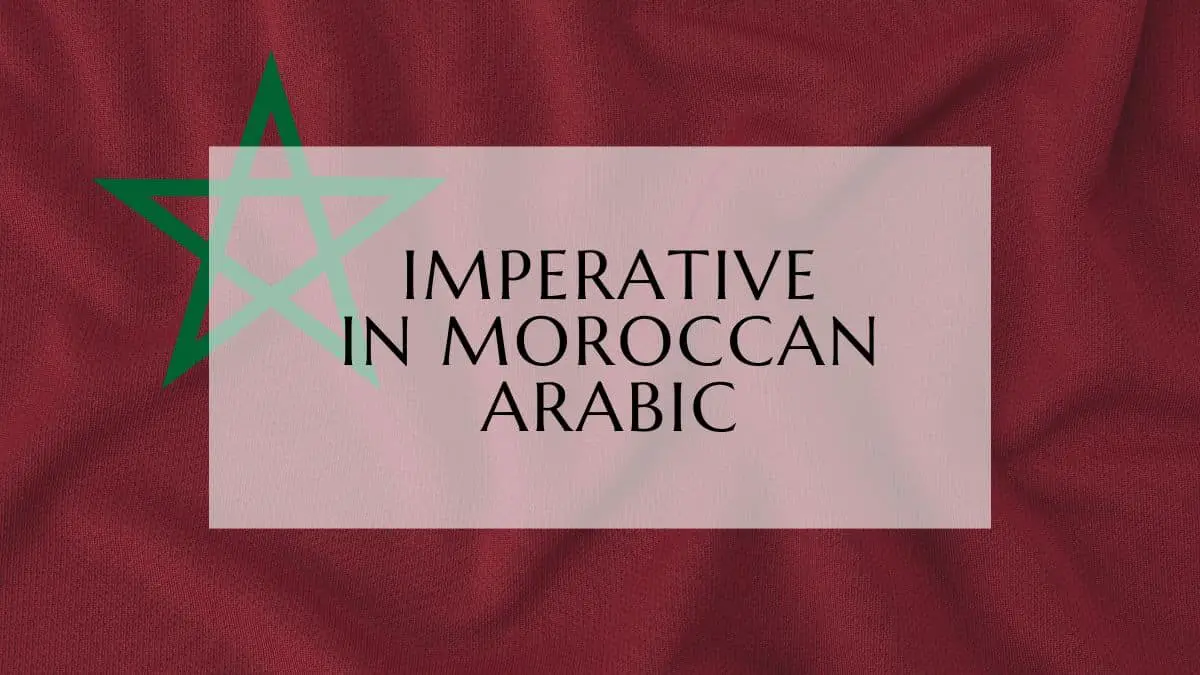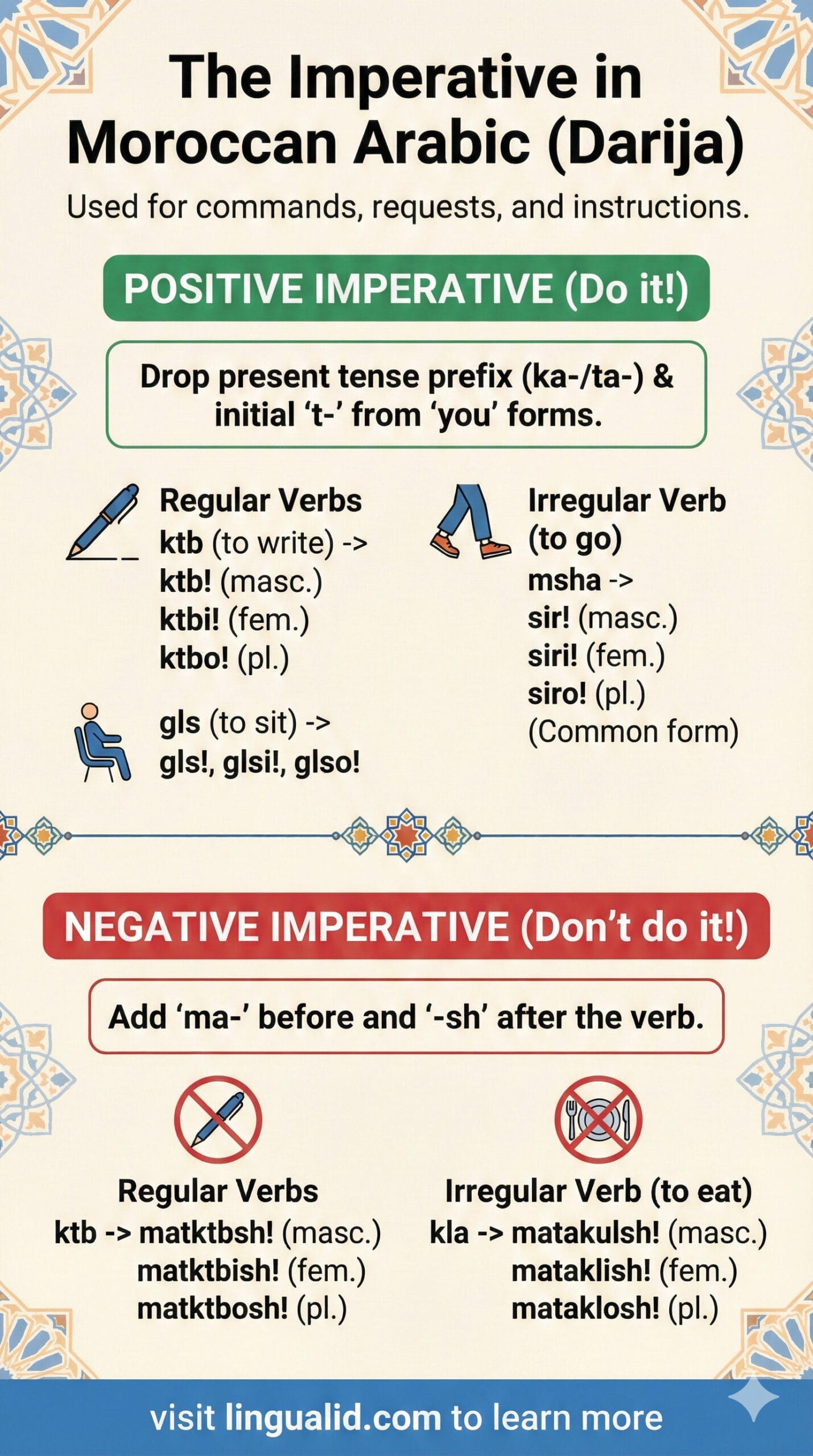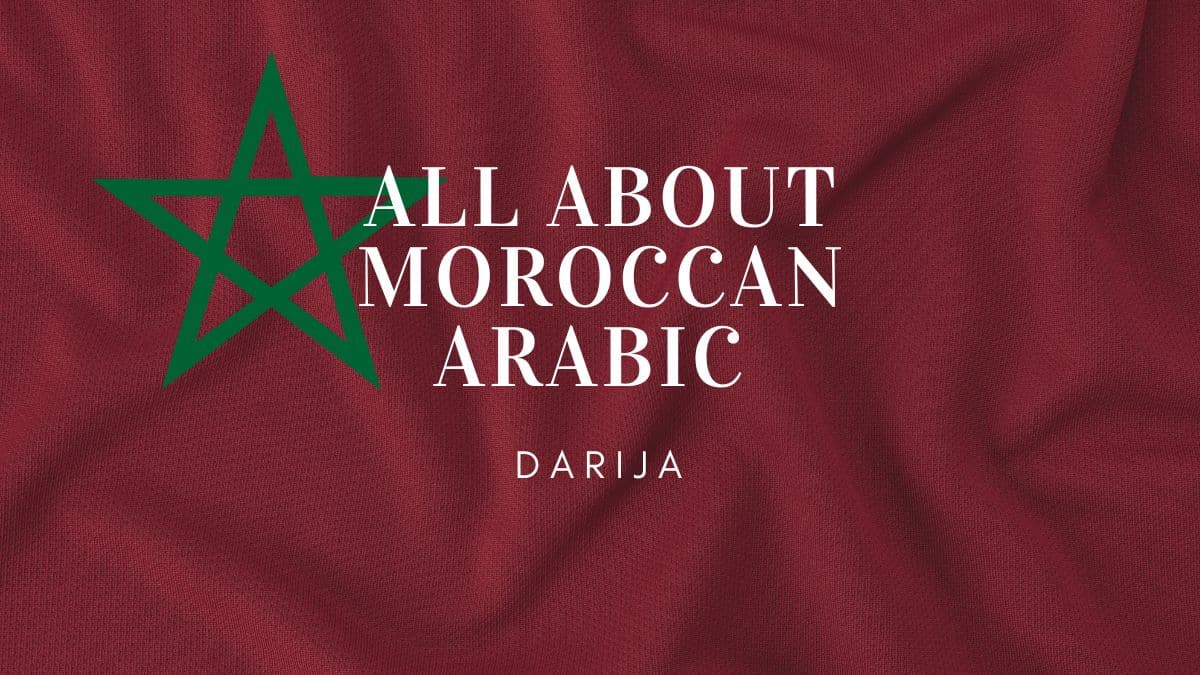In this lesson, we will talk about the imperative in Moroccan Arabic, and how to use it in both positive and negative forms.

The Imperative In Moroccan Arabic
To form the positive imperative in Moroccan Arabic, we drop ka/ta and the prefix -t from the singular and plural “you” pronouns in the present tense.
Example: ktb (write)
| Pronoun | Present | Imperative |
| You (masc. sing.) | Katktb / كتكتب | ktb! / كتب |
| You (fem. sing.) | Katktbi / كتكتبي | ktbi! / كتبي |
| You (plural) | Katktbo / كتكتبو | Ktbo! / كتبو |
Example: gls (to sit)
| Pronoun | Present | Imperative |
| You (masc. sing.) | Katgls / كتجلس | gls! / جلس |
| You (fem. sing.) | Katglsi / كتجلسي | glsi! / جلسي |
| You (plural) | Katglso / كتجلسو | glso! / جلسو |
Example: msha (to go)
| Pronoun | Present | Imperative |
| You (masc. sing.) | Katmshi / كتمشي | mshi! / مشي |
| You (fem. sing.) | Katmshi / كتمشي | mshi! / مشي |
| You (plural) | Katmshw / كتمشيو | mshiw! / مشيو |
In some areas in Morocco, people use Mshi! Mshiw! but in the majority of areas, you will hear Sir! Siri! Siro! instead (only in the positive form!), so this is something to keep in mind.
Example: gal (to say)
| Pronoun | Present | Imperative |
| You (masc. sing.) | Katgul / كتقول | gul! / قول |
| You (fem. sing.) | Katguli / كتقولي | guli! / قولي |
| You (plural) | Katgulo / كتقولو | gulo! / قولو |
Example: kla (to eat)
Kul is an irregular verb also in the imperative form:
| Pronoun | Present | Imperative |
| You (masc. sing.) | Katakul / كتاكل | kul! / اكل |
| You (fem. sing.) | Katakli / كتاكلي | kuli! / اكلي |
| You (plural) | Kataklo / كتاكلو | kulo! / اكلو |
Example: ja (to come)
Notice how the irregular ja requires adding A in the beginning:
| Pronoun | Present | Imperative |
| You (masc. sing.) | Katji / كتجي | aji! / اجي |
| You (fem. sing.) | Katji / كتجي | aji! / اجي |
| You (plural) | Katjw / كتجيو | ajiw! / اجيو |
Note: you can practice what you’ve learned here, and learn how to pronounce each of the words in our Memrise course here, don’t know how to use the platform or sign up? we’ve got you covered in this easy-to-follow tutorial here.
The Negative Imperative In Darija
Similar to what we talked about in the lesson about negation, the negative imperative will have the markers mat- and -sh with the positive imperative in between:
Example: ktb (write)
| Pronoun | Present | Negative Imperative |
| You (masc. sing.) | Katktb / كتكتب | matktbsh! / متكتبش |
| You (fem. sing.) | Katktbi / كتكتبي | matktbish! / متكتبيش |
| You (plural) | Katktbo / كتكتبو | matktbosh! / متكتبوش |
Example: gls (to sit)
| Pronoun | Present | Negative Imperative |
| You (masc. sing.) | Katgls / كتجلس | matglssh! / متجلسش |
| You (fem. sing.) | Katglsi / كتجلسي | matglsish! / متجلسيش |
| You (plural) | Katglso / كتجلسو | matglsosh! / متجلسوش |
Example: msha (to go)
| Pronoun | Present | Negative Imperative |
| You (masc. sing.) | Katmshi / كتمشي | matmshish! / متمشيش |
| You (fem. sing.) | Katmshi / كتمشي | matmshish! / متمشيش |
| You (plural) | Katmshw / كتمشيو | matmshiwsh! / متمشيوش |
There is no matsirsh, matsirish, matsirosh!

Example: gal (to say)
| Pronoun | Present | Negative Imperative |
| You (masc. sing.) | Katgul / كتقول | matgulsh! / متقولش |
| You (fem. sing.) | Katguli / كتقولي | matgulish! / متقوليش |
| You (plural) | Katgulo / كتقولو | matgulosh! / متقولوش |
Example: kla (to eat) -irregular-
| Pronoun | Present | Negative Imperative |
| You (masc. sing.) | Katakul / كتاكل | matakulsh! / متاكلش |
| You (fem. sing.) | Katakli / كتاكلي | mataklish! / متاكليش |
| You (plural) | Kataklo / كتاكلو | mataklosh! / متاكلوش |
Example: ja (to come) -irregular-
| Pronoun | Present | Negative Imperative |
| You (masc. sing.) | Katji / كتجي | matjish! / متجيش |
| You (fem. sing.) | Katji / كتجي | matjish! / متجيش |
| You (plural) | Katjw / كتجيو | matjiwsh! / متجيوش |
Moroccan Arabic Imperative Conjugations: A Study Guide
Quiz
- How is the positive imperative formed in Moroccan Arabic? Provide an example.
- What are the imperative forms of the verb “to go” (msha) in the positive form?
- Which verb serving as an example in the text is irregular in both the present and imperative forms? Conjugate this verb in the positive imperative.
- Provide the positive imperative conjugations for the verb “to come” (ja).
- Explain the difference in usage between “Mshi! Mshiw!” and “Sir! Siri! Siro!”
- How is the negative imperative formed in Moroccan Arabic?
- What two grammatical markers are used to create the negative imperative?
- Provide an example of a negative imperative conjugation using the verb “to write” (ktb).
- Is there a negative imperative form for the verb “msha” using “sir”? Why or why not?
- Conjugate the verb “to eat” (kla) in the negative imperative.
Answer Key
- The positive imperative is formed by dropping “ka/ta” and the prefix “-t” from the singular and plural “you” pronouns in the present tense. For example, the present tense verb “katktb” (you write) becomes “ktb!” (write!) in the imperative.
- The imperative forms of “msha” are “mshi!” (masculine singular/feminine singular) and “mshiw!” (plural).
- The verb “kla” (to eat) is irregular in both the present and imperative forms. The positive imperative conjugations are “kul!” (masculine singular), “kuli!” (feminine singular), and “kulo!” (plural).
- The positive imperative conjugations for “ja” are “aji!” (masculine singular/feminine singular) and “ajiw!” (plural).
- Both “Mshi! Mshiw!” and “Sir! Siri! Siro!” are used for the positive imperative of “to go.” While “Mshi! Mshiw!” is used in some areas, “Sir! Siri! Siro!” is more common in most of Morocco.
- The negative imperative is formed by placing the markers “mat-” and “-sh” around the positive imperative verb form.
- The markers “mat-” and “-sh” are used to create the negative imperative.
- The negative imperative conjugation for “to write” (ktb) is as follows: “matktbsh!” (masculine singular), “matktbish!” (feminine singular), “matktbosh!” (plural).
- There is no negative imperative form using “sir.” The text specifically states, “There is no matsirsh, matsirish, matsirosh!”
- The negative imperative conjugations for “to eat” (kla) are “matakulsh!” (masculine singular), “mataklish!” (feminine singular), and “mataklosh!” (plural).

Happy learning!
Oualid Cheddadi is the founder of Lingualid, a platform that inspires independent language learners worldwide, regardless of the language they are learning. The name “Lingualid” is derived from the Portuguese word for “language,” “língua,” and the last three letters of Oualid’s name, “Lid.”



